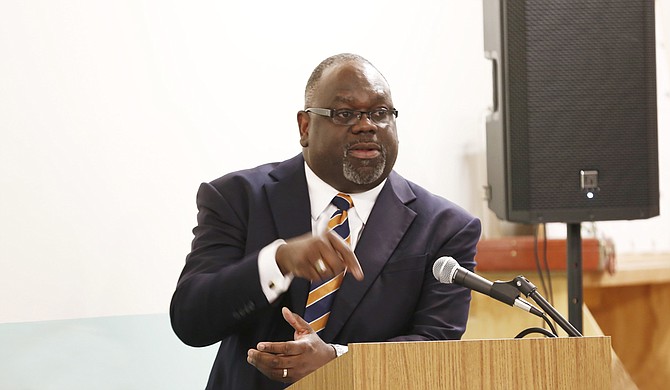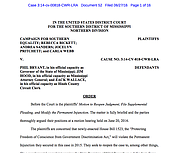U.S. District Judge Carlton Reeves blocked a part of House Bill 1523 on Monday that says circuit clerks can recuse themselves from issuing marriage licenses. Photo by Imani Khayyam.
JACKSON — On Monday, U.S. District Judge Carlton Reeves blocked the part of House Bill 1523 that says circuit clerks can recuse themselves from issuing same-sex marriage licenses due to a “sincerely held religious belief or moral conviction.”
Judge Reeves issued an order in the first Campaign for Southern Equality v. Bryant case, now referred to as “CSE I,” asking the parties to modify the permanent injunction in the case to ensure all circuit clerks in the state are aware of how the case binds them.
New York-based attorney Roberta Kaplan had asked Judge Reeves to re-open the case due to HB 1523’s effect on the permanent injunction that legalized same-sex marriage in the state and required circuit clerks statewide to issue marriage licenses to all couples.
HB 1523, Judge Reeves writes, “is permitting the differential treatment to be carried out by individual clerks. … A statewide policy has been ‘pushed down’ to an individual-level policy. But the alleged constitutional infirmity is the same. The question remains whether the Fourteenth Amendment requires marriage licenses to be granted (and out-of-state marriage licenses to be recognized) to same-sex couples on identical terms as they are to opposite-sex couples.”
“The identity of issues is no coincidence. HB 1523’s proponents candidly admitted that the bill was passed in response to Obergefell,” Reeves continued.
Judge Reeves has asked the two parties in the case to notify the remaining 81 circuit clerks in the state that they are bound by the permanent injunction to issue marriage licenses to same-sex couples. It's up to them, the state and Kaplan, to get together and discuss who is in charge of notifying the clerks and how it should be done.
The judge wrote that adding language from Obergefell to the permanent injunction in the case will help clarify that the Supreme Court’s ruling will be enforced.
“The point of adding Obergefell’s language is simple: The Supreme Court’s ruling will be enforced. Obergefell is the law of the land and, consequently, the law of this circuit,’” Reeves wrote. “Mississippi’s elected officials may disagree with Obergefell, of course, and may express that disagreement as they see fit—by advocating for a constitutional amendment to overturn the decision, for example. But the marriage license issue will not be adjudicated anew after every legislative session. And the judiciary will remain vigilant whenever a named party to an injunction is accused of circumventing that injunction, directly or indirectly.”
Lt. Gov. Tate Reeves spoke out against the ruling late on Monday.
“If this opinion by the federal court denies even one Mississippian of their fundamental right to practice their religion, then all Mississippians are denied their 1st Amendment rights,” Reeves said in a statement. “I hope the state’s attorneys will quickly appeal this decision to the 5th Circuit to protect the deeply held religious beliefs of all Mississippians.”
Judge Reeves has yet to issue an order in the remaining two cases that challenge the constitutionality of HB 1523 on the whole, and he has until Friday to issue a permanent injunction blocking the whole bill from becoming law.
For more on HB 1523 and LGBT rights, visit jfp.ms/lgbt. Email reporter Arielle Dreher news tips at [email protected], and follow her on Twitter at @arielle_amara for updates.




Comments
Use the comment form below to begin a discussion about this content.
comments powered by Disqus